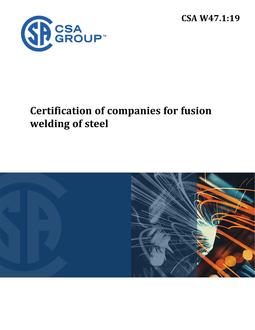CSA W47.1:19
Click here to purchase
Scope
1.1
This Standard provides the requirements for the certification of companies engaged in the fusion welding of steel and the qualification of their personnel and welding procedures.
Note: This Standard is not intended for applications governed by codes such as the American Society of Mechanical Engineers (ASME) Boiler and Pressure Vessel Code and codes of the American Petroleum Institute (API).
1.2
The requirements of this Standard are based on the principle that a certified company has full responsibility for the quality of the welded product it produces and this responsibility cannot be transferred to its employed or retained personnel, or to the administrator of this Standard.
1.3
This Standard governs the certification of companies. Certification pertains to the capability of the company with respect to welding. Certification should not be construed as approving any products or services of the certified company.
1.4
This Standard stipulates requirements for
a) welding engineers;
b) welding supervisors;
c) tack welders, welders, and welding operators; and
d) documentation.
1.5
The qualification requirements for tack welders, welders, and welding operators specified in this Standard are intended to demonstrate an individual’s basic welding skills and to provide a means of verifying that individual’s continuing ability in the fusion welding of steel.
1.6
Provisions for recognition of personnel qualified under other jurisdictions are included in this Standard.
1.7
For welding of stainless steel, Annex K of this Standard specifies provisions for the qualification of welding procedures and personnel.
1.8
This Standard does not address the safety issues associated with welding and welding practices.
Note: CSA W117.2 addresses safety in welding and should be followed, in addition to any applicable workplace health and safety legislation in effect. It is the responsibility of the user of this Standard to establish appropriate safety and health practices and determine the applicability of regulatory limitations prior to use.
1.9
In this Standard, “shall” is used to express a requirement, i.e., a provision that the user is obliged to satisfy in order to comply with the standard; “should” is used to express a recommendation or that which is advised but not required; and “may” is used to express an option or that which is permissible within the limits of the Standard.
Notes accompanying clauses do not include requirements or alternative requirements; the purpose of a note accompanying a clause is to separate from the text explanatory or informative material.
Notes to tables and figures are considered part of the table or figure and may be written as requirements.
Annexes are designated normative (mandatory) or informative (non-mandatory) to define their application.
1.10
The values given in SI units are the units of record for the purposes of this Standard. The values given in parentheses are for information and comparison only.
Product Details
- Edition:
- 7th
- Published:
- 10/01/2019
- ISBN(s):
- 9781488318948
- Number of Pages:
- 299
- File Size:
- 1 file , 3.7 MB
- Product Code(s):
- 2426803, 2426801, 2426801
